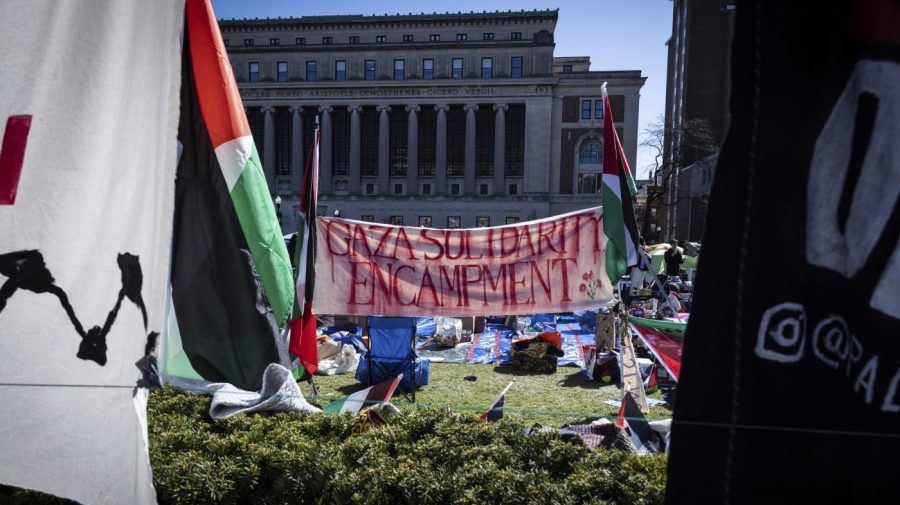The intifada revolution has engulfed Columbia University. Just a week after a congressional hearing in which President Minouche Shafik touted her school’s efforts to combat antisemitism, protests rife with antisemitism raged on Columbia’s campus. Shafik tried to assuage lawmakers’ concerns on April 18 by dispersing an unsanctioned anti-Israel protest on Columbia’s lawn, leading to more than 100 students getting arrested. But many returned, and the demonstrations grew, testing Shafik’s commitment to defending Jewish students.
At a House Committee on Education and the Workforce hearing, Shafik acknowledged that Columbia’s anti-Israel demonstrations were rife with antisemitism, admitted that there was a problem and pointed to steps she had taken to combat the issue. Shafik cited a new demonstration policy of Feb. 19 that confines protests to a designated location on weekday afternoons, with two-day advance notice and approval from the university, and accountability measures for policy violators.
But just one day after the hearing, many students returned, and were hurling abusive phrases like, “We don’t want no Zionists here” and “Oh Hamas, my beloved, strike Tel Aviv.” The circus at Columbia attracted jesters right outside campus, including one who vowed, “October 7th will happen every day for you … 10,000 times” and another who allegedly punched Arab-Israeli activist Yoseph Hadad in the face. The situation got so out of hand that a Columbia University rabbi warned Jewish students to go home and the university moved to virtual classes on April 22.
This was the culmination of months of hostility. A Jewish student was pinned to the wall on Feb. 2 and then told to “keep f*cking running” when he broke free, and another was whacked with a stick by pro-Hamas protesters. Pro-Hamas protesters have routinely shouted “F*** the Jews,” “Down with the Jews,” and “Down with Israel,” spit on Jewish students while walking to class and threatened supporters of Israel online with phrases like “I wish you enormous pain and suffering and maybe only after you will understand an ounce of what you inflicted on Palestine.”
Columbia has taken measures to curb pro-Hamas activity on campus, but they have fallen short. While Columbia banned Students for Justice in Palestine (SJP), Columbia University Apartheid Divest (CUAD) effectively replaced it. Faculty for Justice in Palestine at Columbia — the abode of pro-Hamas professors in coordination with SJP — remains alive and well, with most of its members still teaching and influencing students. Radical professors Shafik claimed were released from their positions — either from the classroom or from a committee chair role — were still in their positions as of the congressional hearing. Professor Joseph Massad, who described Hamas’s Oct. 7 attack as “awesome,” and Katherine Franke, who said Israeli military veterans are all “dangerous and shouldn’t be on campus,” may have been “spoken to” but received no real consequences. During the hearing, Mohamed Abdou remained on-premises at the unsanctioned protests.
Shafik claimed to have suspended 15 students related to antisemitic incidents. However, only three students were given interim suspensions for antisemitism, and all three suspensions were lifted or reduced to probation. Additionally, of the 10 suspensions stemming from CUAD hosting an event featuring speakers from a group banned by Germany and Israel for serving as a front for a U.S.-designated terrorist group, five were lifted because Columbia determined those students weren’t involved.
On the night of the House hearing, a Jewish Columbia student wearing a kippah was beaten and left with marks around his neck. Jewish students reported “trouble sleeping” and fear of walking to class. Barnard senior Noa Fay said that it was “nearly impossible” “to get through” last semester “academically and mentally” because antisemitism “has consumed every aspect of our student life.”
And even after Columbia’s big show of arresting and dispersing unsanctioned protesters, some arrested and suspended students have already returned and reoccupied the campus lawn. One student described Columbia as a “war zone.” Jewish alumni sent an open letter to Shafik stating that Columbia is under “mob rule” and “violence against Jewish students is imminent,” calling for “immediate closure of Columbia gates and enforcement of University rules of conduct.”
A lack of true consequences and inconsistent enforcement of policies will only continue to embolden anti-Israel students to harass their Jewish classmates and motivate pro-Hamas faculty to spew pro-terror rhetoric, validating the fear of Columbia Jewish alumni.
Is Shafik’s commitment to combatting antisemitism genuine, or nothing more than a show to retain her position? That is the question. Shafik must restore order and the confidence of her Jewish students.
If Shafik wants to keep her job, she must protect her Jewish students and restore civility at Columbia; to do that, she must send the pro-Hamas revolutionaries a clear message: Columbia’s stance against antisemitic harassment comes with swift and serious consequences — not just words, but actions. That is the only solution to Columbia’s intifada revolution.
David May is a research manager and senior research analyst at the Foundation for Defense of Democracies, where Sabrina Soffer is a research intern. Follow David on X @DavidSamuelMay.
